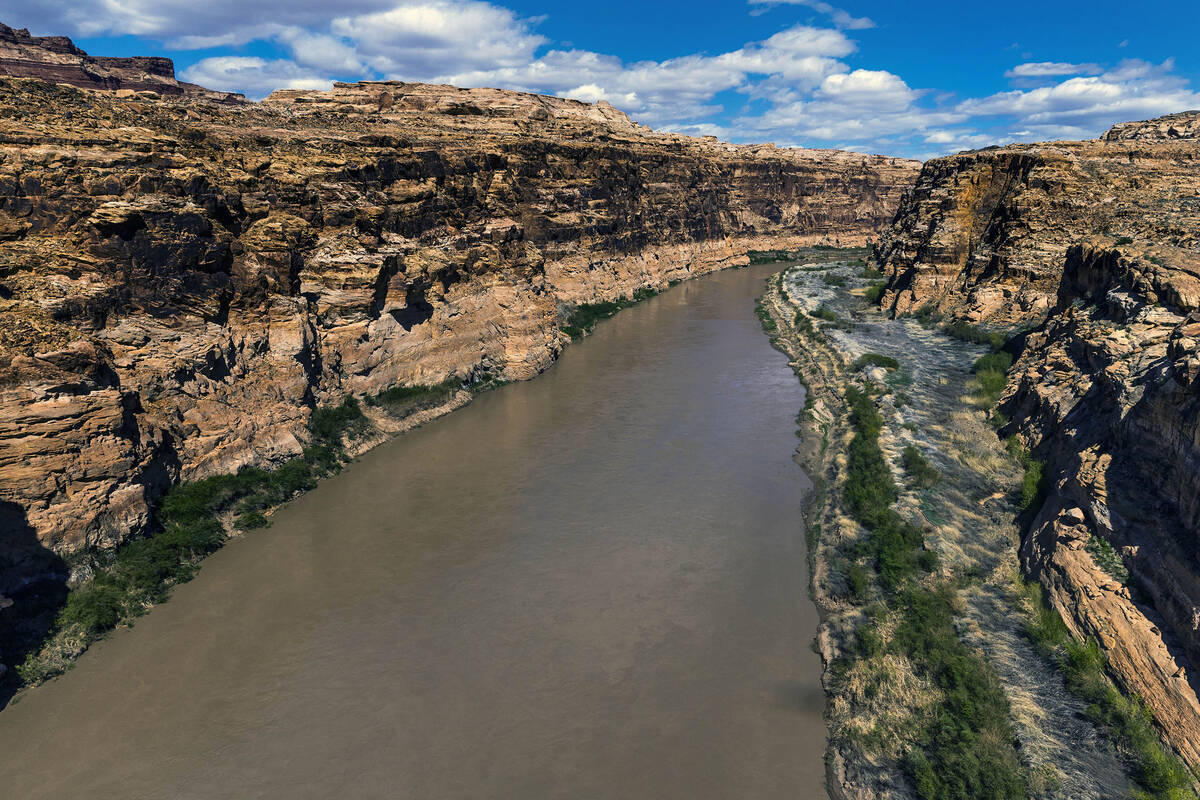‘Phenomenal progress’: Water use in Southern Nevada inches toward goal
Water savings in the Las Vegas Valley are soaring despite population growth, largely thanks to a wetter-than-normal 2023 and persistent conservation efforts over the past 20 years.
The Southern Nevada Water Authority accepted its 2024 water resource plan and budget Thursday, setting goals for the upcoming year and taking inventory of the ongoing Colorado River crisis.
It also approved an increase for single-family homeowners to remove non-water-efficient grass and a near $35.2 million incentive for the Clark County School District to convert school fields to artificial turf and update its landscaping.
For 2023, preliminary numbers show the valley’s water use at 89 gallons per person a day, compared with 104 in 2022 and 235 in 1990.
Colby Pellegrino, the water authority’s deputy general manager, still issued a word of caution: A wetter and cooler year accounts for a reduction of about 8 gallons per person a day, but that won’t last. Years in which there has been extra water to fill critical reservoirs are notoriously followed by drier, hotter ones, she said.
“I wouldn’t be surprised to see the same thing we saw in 2020 after the really wet year in 2019,” Pellegrino said. “We would see our gallons per capita and our use go up next year. But, overall, we’re still making phenomenal progress.”
Among the measures the authority has taken over the past few years is implementing what are known as excessive use charges — controversial fines of $9 per 1,000 gallons consumed over a set amount of water that varies by season. Managers also have banned the installation of new septic systems that don’t allow for water reuse, reduced golf courses’ water budgets, limited swimming pool sizes and more.
The authority’s goal is to slash the daily use to 86 gallons per person, spokesperson Bronson Mack said, even in the face of what’s bound to be a drier 2024.
“If we can get to 86, we can extend our water supply out for the next 50 years and not have to bring new water into the valley,” Mack said. “We can continue to live within our means.”
Conservation measures continue
With receiving an update on the delicate state of the Colorado River, the board is increasing the incentive for single-family homeowners to replace water-inefficient landscaping this year.
If Southern Nevadans take part in the Water Smart Landscape Rebate program before the end of 2024, they can be refunded up to $5 per square foot up to 10,000 square feet and up to $3.50 per square foot after that. That’s a $2 increase, made possible by a $24 million grant from the state of Nevada.
The $5-per-square-foot rate should cover the cost of most standard conversion projects, staff said at the meeting. After 2024 ends, the rate will go back to the original rate.
The most-discussed item on Thursday’s agenda was the school district rebate, which will subsidize the conversion of the district’s fields to artificial turf.
Materials used in the district project will not have crumb rubber — a material that has raised concerns across the country over emitting potentially cancer-causing chemicals. But some remain unsure whether water savings are worth it with the possibility of runoff from PFAS, or “forever chemicals,” and contribution to the urban heat island effect, which could see hotter surface temperatures as the planet warms.
Addressing the urban heat island effect, Pellegrino said the authority has an up-to-$100-per-tree incentive to increase shade and continues to allocate money toward canopy cover throughout the valley.
“Landscaping cannot overcome the urban heat island effect, but it does help in managing it,” Pellegrino said. “We find shade is the most effective thing at managing the urban heat island effect.”
Still, some such as parent Alex Kleytman are worried that there’s a lack of transparency in the effort to convert fields to artificial turf, especially considering that the average working parent is unable to attend daytime government meetings.
Kleytman’s children play lacrosse for Foothill High School in Henderson. He counts them lucky that their sport season ends before the hotter summer months.
“They’re banning under the auspices of the need to save the water without knowing how it’s going to affect them when they turn 25,” he said. “And that’s horrible.”
Contact Alan Halaly at ahalaly@reviewjournal.com. Follow @AlanHalaly on X.



















